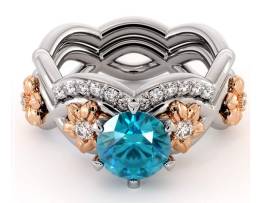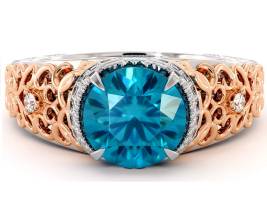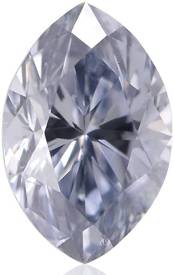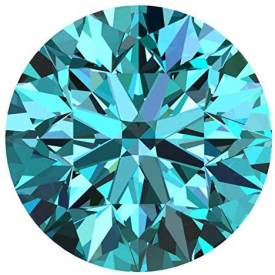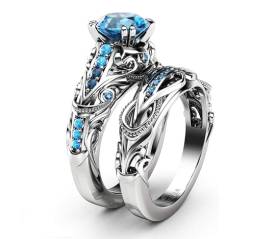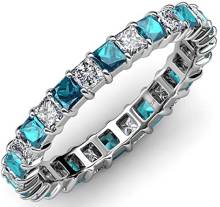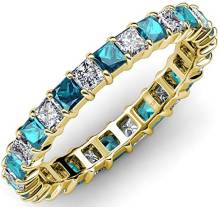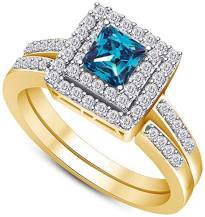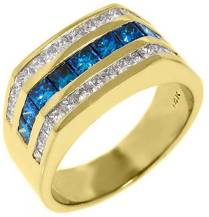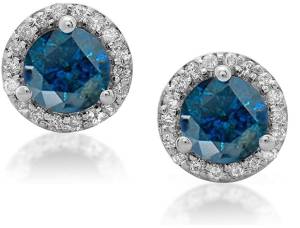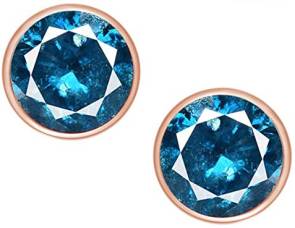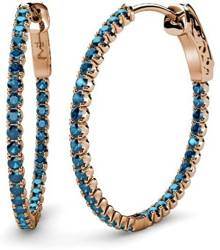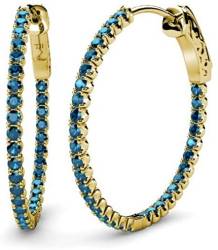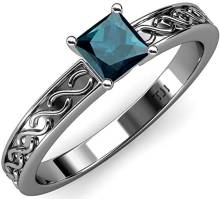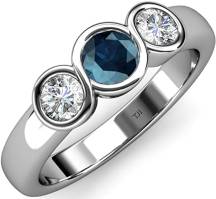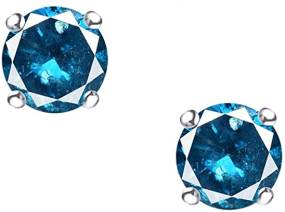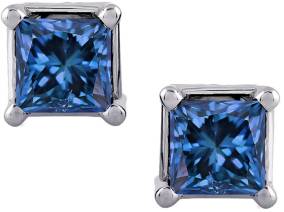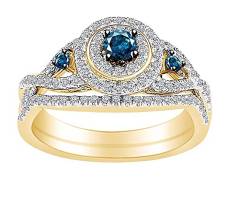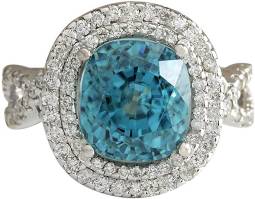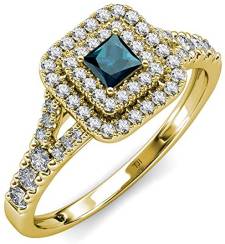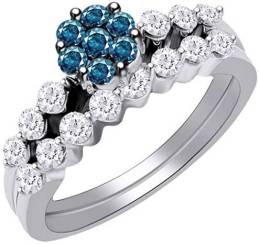Blue diamond is a prevailing superstar on the auction scene making a huge splash every time it has come under the hammer in the past decade. It is among the most desired, rare and expensive diamond in the world.
Click On The Images
How can one explain the exciting enthusiasm for these diamonds and the stratospheric prices that they command? Diamond-brokers to gemologists, connoisseurs to investors and leading jewelers to industry experts have a common answer: extreme rarity. And we all know that rarity equals to value in this world.
Click On The Images
The Cherished Blue Eyed Boy
Interest is soaring for color diamonds in general which in part explains the growing interest in blue diamonds.
Just fifteen years in the past, trade in color diamonds was only a tiny segment of what it is today. The fashion industry has nurtured the appeal of color diamonds by launching vivacious tones in clothing collections.
Unique Blue Diamond Engagement Ring Set White Gold Ring Filigree Ring Blue Diamonds Engagement Ring
Click On The Image
The turn of the Millennia marked a turning point in the demand for blue diamonds. It was at this time that De Beers unveiled its Millennium Jewels Collection at The Millennium Dome in London. The assortment of eleven blue diamonds & one colorless diamond received tremendous attention with media focus on the blue diamonds. It set the conversation rolling in the right circles. Also, just enough of these gemstones became available to establish a robust market. At the same time, prices realized in auctions laid a discernible yardstick for their value.
Click On The Images
Today, people are a lot more aware about the rarity quotient of these extraordinary stones. Information about these glamorous diamonds was earlier available only
Today, people are a lot more aware about the rarity quotient of these extraordinary stones. Information about these glamorous diamonds was earlier available only with the most passionate collectors. However, with knowledge percolating downwards, lovers of high end jewelry too, are yearning for these gems. Many more people are getting besotted with the beauty of blue diamonds. And the recognition of ever-increasing rarity is inflaming the prices. Moreover, blue is a masculine color preferred to be worn by men too. This expands the market further from the traditional forte of females and boosts the stone’s popularity.
Click On The Images
The origin of blue color can be traced to the presence of traces of boron in the crystalline structure of the diamond. Formation of a blue diamond is an extremely rare event in our planet’s history. In general, diamonds are formed under very specific conditions in very limited zones of the earth’s mantle.
To make matters more difficult (if not impossible) blue diamond formation requires a still more specific and special environment. Boron needs to replace nitrogen in this scenario. When a blue diamond is forming, boron particles are entrapped inside its crystal lattice. Boron absorbs yellow from the visible spectrum and reflects the blue, thus imparting blue color to the diamond. The unusual chemical make-up adds to the fascination for these diamonds.
Click On The Images
Color diamonds are extremely rare. One stone among the tens of thousands mined will exhibit any color. And blue diamonds are among the rarest of rare. They are rarer than yellows, reds and pinks. However, they are less rare than reds, violets and purples.
In ancient times, the Golconda region in India was a well known source of blue diamonds. The Hope Diamond is known to have been born here. Today, the Cullinan Mine in South-Africa is a small but consistent source of blue diamonds.
Click On The Images
Importance Of Color Strength
In colorless diamonds (erroneously known as white diamonds) value depends on absence of color. More colorless is a diamond, higher is its value. On the other hand, value of fancy color diamonds depends on presence of colors. Saturated colors are more valuable. The system for color-grading fancy color diamonds is designed to accommodate the fact that not all colored diamonds have the same depth of color.
Click On The Images
Color diamonds are graded according to color saturation. The grades range from fancy, intense, vivid and deep to dark. Fancy denotes the lightest and deep denotes the darkest. Vivid denotes the most desirable color saturation.
Stronger and richer colors are extremely rare and highly valued. Accordingly, the price differences can be extreme too.
Among fancy color diamonds yellows and browns happen to be relatively common colors. Diamonds with noticeable tinge of any other hue are significantly rarer. Even with weak saturation or light tones they are eligible to be called as fancy color diamonds so long as they show color in the face up position. Red, Green & blue diamonds with medium to dark tones & modest saturations are exceptionally rare.
Click On The Images
Diamonds displaying blue color in the face up position occur in a range of shades ranging from faint to intense, vivid, deep & dark. Accordingly, blue diamonds are graded as Faint Blue, Very Light Blue, Light Blue, Fancy Light Blue, Fancy Blue, Fancy Intense Blue, Fancy Dark Blue, Fancy Deep Blue, and Fancy Vivid Blue. A fancy intense blue diamond displays more color than a fancy blue diamond. But vivid blue is the pinnacle of color not easily found. It drives the price to stratospheric levels.
All fancy color diamonds usually display secondary hues. Common secondary colors in blue diamonds are greenish and greyish hues. These are greenish blue, bluish-gray, steely-gray, & vioiletish-blue-gray. Secondary colors have a downwards influence on value. Pure blue always commands a higher premium.
Click On The Images
Size Matters
The size of the stone is another important factor that adds to the price.
Diamond mining in an entire year in the whole world will produce less than 10 rough blue diamonds in the 4 to 7 carats size-range. After polishing these stones turn out to be in the 1 to 3 carats size range. So a large blue diamond is a truly special gem.
The Story Behind The Stone Counts.
Most blue diamonds coming up for sale are not new. There are interesting stories associated with older blue diamonds. A famous example is the Hope Diamond that evokes fascinating tales. A stone’s provenance can enhance its value. Owning such a stone becomes a status symbol.
Demand Pull On The Price
‘Rarity’ is the numero uno factor demand-pulling the prices of blue diamonds to insane levels. For the ultra-rich, blue diamonds are a lucrative asset, status symbol and an intelligent investment rolled into one. These extraordinary treasures of nature trigger an insane desire to possess giving rise to a strong demand which in turn pull up the prices.
Click On The Images
Here is a table showing the prices realized for sale of Blue Diamonds during the last ten years. It will give you an idea of the sky-high prices commanded by these exquisite gemstones.
The Hope Diamond is the world’s largest and most famous deep blue diamond, with a cut weight of 45.52 carats. Formed deep within the core of the Earth more than a billion years ago, it was carried to the surface by a diamond bearing volcanic duct in Golconda, India.
Golconda was once renowned for the diamonds found on the south-east at Kollur Mine near Kollur (modern day Guntur district), Paritala (modern day Krishna district) and cut in the city during the Kakatiya reign.
Many famed diamonds are believed to have been excavated from the mines of Golkonda, such as:
• Darya-e Nur
• Nur-Ul-Ain Diamond
• The Koh-i-noor
• The Hope Diamond
• The Regent Diamond
• Wittelsbach Diamond
Since its discovery in the early 1600s, the hope diamond has gone across oceans and continents, and passed through the hands of kings and commoners. It has an infamous past, having been sold, stolen, recovered and re-cut from the French Blue diamond once in possession of the French Royal Treasury.
The diamond acquires its name from Henry Philip Hope, who added the blue diamond to his collection sometime between the death of King George IV in 1830, and 1839. In 1958, Harry Winston, Inc. donated the Diamond to the Smithsonian Institution, where it remains a compelling showpiece of the National Museum of Natural History.
It has been described as the “most famous diamond in the world” and, after the Mona Lisa, it is the second most-visited artwork in the world.
Click Here To View An Amazing Collection Of Blue Diamond Jewelry
Or Learn About More Colored Diamonds As Follows:
See Also:
Fascinating Facts About Diamonds Straight From Tiffany & Co’s Chief Gemologist
